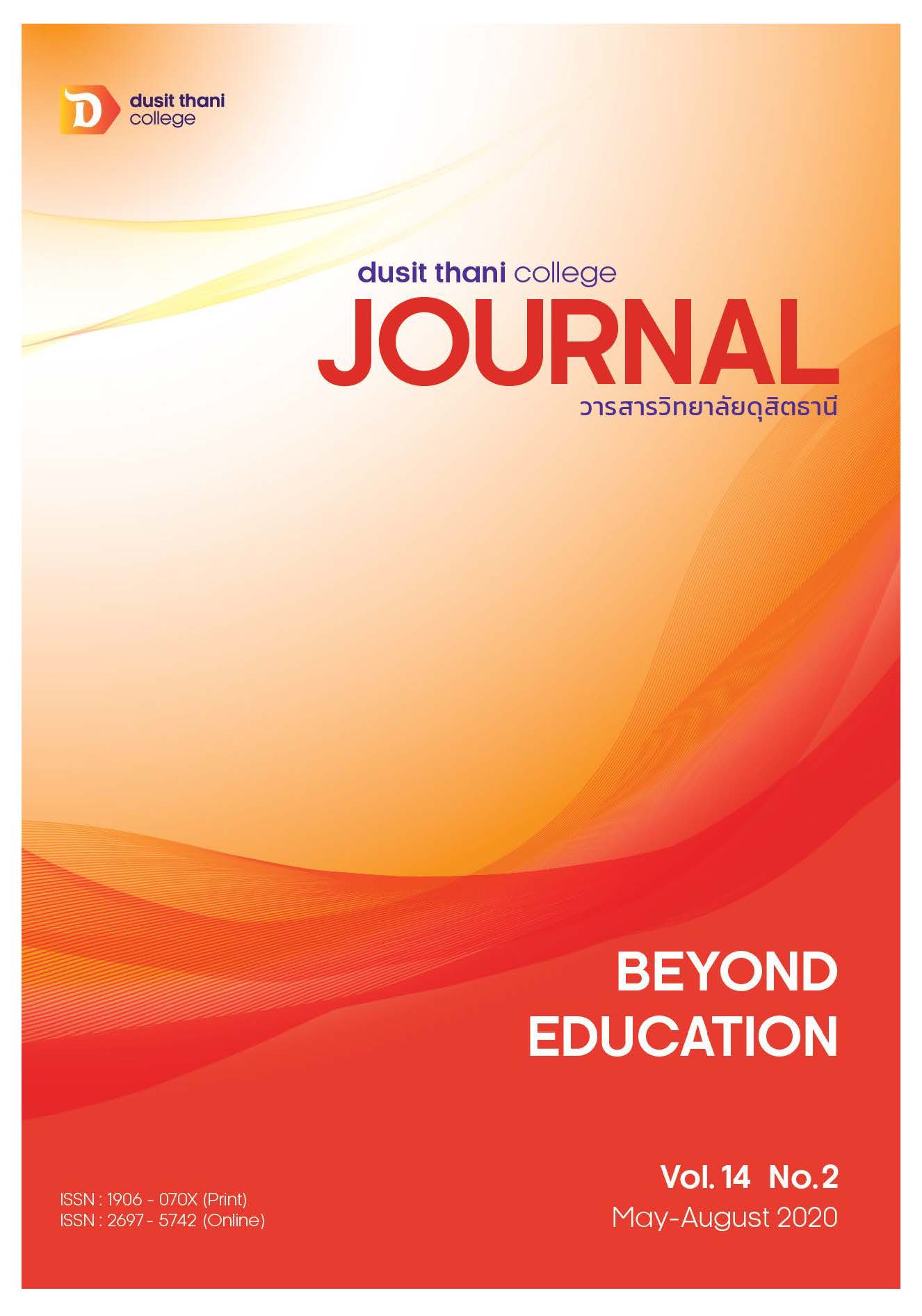Factors Influencing Success of Community Based Tourism: A Case Study of Ban Bang Nam Pueng Community in Samutprakarn Province
Main Article Content
Abstract
This research aims to analyze the influence of factors on the success of CBT and propose guidelines for CBT development of Ban Bang Nam Pueng Community in Samutprakarn Province. This research used quantitative research conducting on questionnaires to collect data from 400 people living in Ban Bang Nam Phueng community. The sample size was determinated by Taro Yamane Formula. The statistical analysis Pearson Bivariate Correlation and Multiple Regression Analysis in Ordinary Least Squares (OLS). The research results show that Community Readiness, Community Engagement, Public Participation and Tourism Policy Framework Factors have a significant influence on The Success of Community Based Tourism, excepting Living Time in Community Variables that is in Community Engagement Factor hasn’t a significant influence on The Success of Community Based Tourism. For guidelines for CBT development should rely on community leaders to communicate information, push participation and build trust with people in the area to create a collaborative work.
Article Details
Article Screening Policy
- All research and academic articles to be published must be considered and screened by three peer reviews in the relevant field / article.
- All articles, texts, illustrations and tables published in the journal are the personal opinions of the authors. Editors don't always have to agree. And no responsibility whatsoever is the sole responsibility of the author.
- The articles to be published must never be published. Where did you first publish? And not in the consideration of other journals If the audit found that there has been a duplicate publication It is the sole responsibility of the author.
- Any article that the reader sees as being plagiarized or impersonated without reference. Or mislead the work of the author Please let the journal editor know it will be your greatest blessing.
References
Bostock, J. (2014). The Meaning of Success. Cambridge: Cambridge University Press.
Decharak, Theera. (2012). Applied statistics: The Primary Chapter of Social Research.
Pathum Thani: Thammasat University Press. (in Thai)
Designated Areas for Sustainable Tourism Administration. (2015). Lesson Learned in Community Based Tourism. Bangkok: Designated Areas for Sustainable Tourism Administration. (in Thai)
Goodwin, H., & Santilli, R. (2009). Community-Based Tourism: A Success?, Paper Presented at The ICRT Occasional Paper 11, Barcelona, Spain.
Karacaoglu, S., & Birdir, K. (2017). Success Factors of Community-Based Tourism (CBT) Perceived by Local Peoples: The Case of 100 Misia Projects. International Rural Tourism and Development Journal, 1(2), 53 - 61.
Khemnoi, Sutharathip. (2011). Factors Affecting Participation in Sustainable Tourism Management Case Study: Bang Luang Market, Bang Len District, Nakhon Pathom Province. Independent Research for Master of Arts. Faculty of Liberal Arts. Silpakorn University. (in Thai)
Kontogeorgopoulos, N. (2014). Success Factors in Community-Based Tourism in Thailand:
The Role of Luck, External Support, and Local Leadership. Tourism Planning & Development, 11(1), 106 - 124.
Leknoi, Ounruen. (2017). Factors for Success in Initiating The Relationship Mission Process to Drive Bangkok into a Low Carbon Metropolis. Journal of Social Research, 40 (2), 1 - 31. (in Thai)
Master of Public Administration Foundation in Thammasat Universit. (2003). Guideline for Public Participation. Bangkok: Faculty of Political Science Thammasat University. (in Thai)
Ministry of Tourism and Sports & Designated Areas for Sustainable Tourism Administration. (2018). Sustainable Community Tourism Development Plan 2015-2020. Bangkok: Designated Areas for Sustainable Tourism Administration. (in Thai)
Nair, V. & Hamzah, A. (2015). Successful Community-Based Tourism Approaches for Rural Destinations. Worldwide Hospitality and Tourism Themes, 7(5), 429 - 439.
Newstrom, J. W. (2015). Organizational Behavior: Human Behavior at Work. Dubuque: McGraw-Hill Education.
Nitikasetsoontorn, S. (2014). The Success Factors of Community-Based Tourism in Thailand. Thesis for Doctor of Philosophy in Development Administration, School of Public Administration, National Institute of Development Administration, Bangkok.
Palangsi, Piyathida. (2014). Factors Affecting Public Participation in Community Based Tourism in Khanom District, Nakhon Si Thammarat Province. Thesis for Master of Science. Faculty of Science. Chulalongkorn University. (in Thai)
Preston, J. P. (2013). Community Involvement in School: Social Relationships in a Bedroom Community. Canadian Journal of Education, 36(3), 413 - 437.
Sarobol, Sin. & et al. (2003). Community Based Tourism: Concepts and Experiences in
The Northern Region. Chiang Mai: Thailand Research Fund Press. (in Thai)
Suansri, Phochana. (2003). Guideline for Managing Community Based Tourism. Bangkok: Travel for Life and Nature Press. (in Thai)
Vinijnaiyapak, Nattha. (2013). Participatory Democracy with Public Politics. Bangkok:
Golden Time Press. (in Thai)
Viriyaratwanlop, Preeyanuch. (1980). Community Engagement: A Case Study of Ban Chi Community Lopburi. Thesis for Master of Sociology and Anthropology.
Faculty of Sociology and Anthropology. Thammasat University. (in Thai)
Wasserman, J. M. (1982). Size of Place in Relation to Community Attachment and Satisfaction. Social Indicators Research, 11(4), 421 - 436.
Williams, O. D. (2014). Factors Influencing Community Participation in Cultral Tourism at Kit Mikayi in Kisumu County, Kenya. Thesis for Master of Arts, Faculty of Arts,
The University of Nairobi, Nairobi.
Yamane, T. (1967). Statistics: An Introductory Analysis. New York: Harper and Row.


